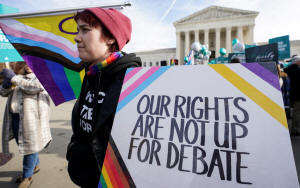LGBT rights yield to religious interests at US Supreme Court
 Send a link to a friend
Send a link to a friend
 [July 01, 2023]
By John Kruzel [July 01, 2023]
By John Kruzel
WASHINGTON (Reuters) - In its decision permitting an evangelical
Christian web designer to refuse service for same-sex weddings, the U.S.
Supreme Court again embraced an expansive view of religious interests at
the expense of protections for LGBT people.
In a 6-3 ruling on Friday powered by its conservative majority, the
court backed Lorie Smith, who owns a Denver-area web design business
called 303 Creative. She sued Colorado's civil rights commission in 2016
because she said she feared being punished for refusing to serve gay
weddings under a state law that bars businesses open to the public from
denying goods or services to people because of race, gender, sexual
orientation, religion and certain other characteristics.
The ruling, citing the U.S. Constitution's First Amendment protections
for free speech, stated that Colorado cannot force Smith to create
speech she opposes.
Although presented to the court as a free speech claim, Smith's case
shares features with other recent clashes between religiously motivated
activity and civil rights laws.
"We've seen a dramatic expansion of rights for conservative religious
communities that has had a detrimental impact on equality rights,
certainly for LGBTQ people," said Elizabeth Platt, director of the Law,
Rights and Religion Project at Columbia Law School.
Colorado is one of 22 U.S. states with measures explicitly barring
discrimination based on sexual orientation and gender identity in public
accommodations.

Smith, who said she opposes gay marriage based on her Christian beliefs,
was represented by the Alliance Defending Freedom, a conservative
religious rights group.
"The court reiterated that it's unconstitutional for the state to
eliminate from the public square ideas it dislikes, including the belief
that marriage is the union of husband and wife," said Kristen Waggoner,
the group's president who argued the case before the court.
"Disagreement isn't discrimination, and the government can't mislabel
speech as discrimination to censor it," Waggoner added.
Alliance Defending Freedom has represented other high-profile litigants
before the justices including Colorado baker Jack Phillips, who refused
based on his Christian beliefs to make a wedding cake for a gay couple.
In its 7-2 ruling in 2018 in the case Masterpiece Cakeshop v. Colorado
Civil Rights Commission, the court decided that the commission had shown
impermissible hostility toward religion when it found that Phillips
violated the state anti-discrimination law by rebuffing two men who were
getting married.
The justices in that case stopped short of issuing a definitive ruling
on the circumstances under which people can seek exemptions from
anti-discrimination laws based on religion. Still, the ruling
illustrated a disparity in how the court views protections for LGBT
people in contrast to the competing conservative Christian interests,
Platt said.
"The court treated Jack Phillips' claim of discrimination with extreme
deference and sensitivity, while entirely glossing over the
discrimination against the same-sex couples in that case," Platt said.
[to top of second column]
|

A protester carries a sign as acctivists
demonstrate outside the U.S. Supreme Court, where justices were set
to hear arguments in a major case pitting LGBT rights against a
claim that the constitutional right to free speech exempts artists
from anti-discrimination laws in a dispute involving an evangelical
Christian web designer who refuses to provide her services for
same-sex marriages, in Washington, U.S., December 5, 2022.
REUTERS/Kevin Lamarque/File Photo

FOSTER CARE RULING
The court in 2021 decided another dispute involving tensions between
equality protections and religious freedom.
In Fulton v. City of Philadelphia, the court in a 9-0 ruling
embraced religious rights over LGBT rights, siding with a Catholic
Church-affiliated agency that sued after Philadelphia refused to
place children for foster care with the organization because it
barred same-sex couples from applying to become foster parents.
The court's composition shifted with the 2018 retirement of Justice
Anthony Kennedy, who was succeeded by Justice Brett Kavanaugh, one
of Republican former President Trump's three conservative
appointees, along with Justices Neil Gorsuch - the author of
Friday's ruling - and Amy Coney Barrett.
Kennedy was the swing vote on what then was a 5-4
conservative-majority court. He stood out among conservatives in his
espousal of sympathy both for conservative Christian causes and for
what is sometimes called the "dignity interests" of marginalized
groups including LGBT people.
Kennedy's emphasized the dignity of gay couples in his landmark 5-4
decision in Obergefell v. Hodges that legalized same-sex marriage
nationwide in 2015.
Platt said that "if Obergefell had been litigated under this Supreme
Court, I don't think it would come out the same way."
The court underwent another dramatic change to its ideological
composition in 2020 when Trump named Barrett to succeed the late
liberal justice Ruth Bader Ginsburg. Barrett's addition gave it a
6-3 conservative margin and recalibrated how it weighed conservative
Christian causes against the dignity interests of people protected
by civil rights laws.
"This court continues to advance the agenda of religious extremists
who are trying to force all of us to live by their narrow beliefs,"
said Rachel Laser, president of the secular group Americans United
for Separation of Church and State.
Following Friday's ruling, Smith said, "I hope that, regardless of
what people think of me or my beliefs, everyone will celebrate that
the court upheld the right for each of us to speak freely."
(Reporting by John Kruzel; Editing by Will Dunham)
[© 2023 Thomson Reuters. All rights
reserved.]This material may not be published,
broadcast, rewritten or redistributed.
Thompson Reuters is solely responsible for this content.
 |